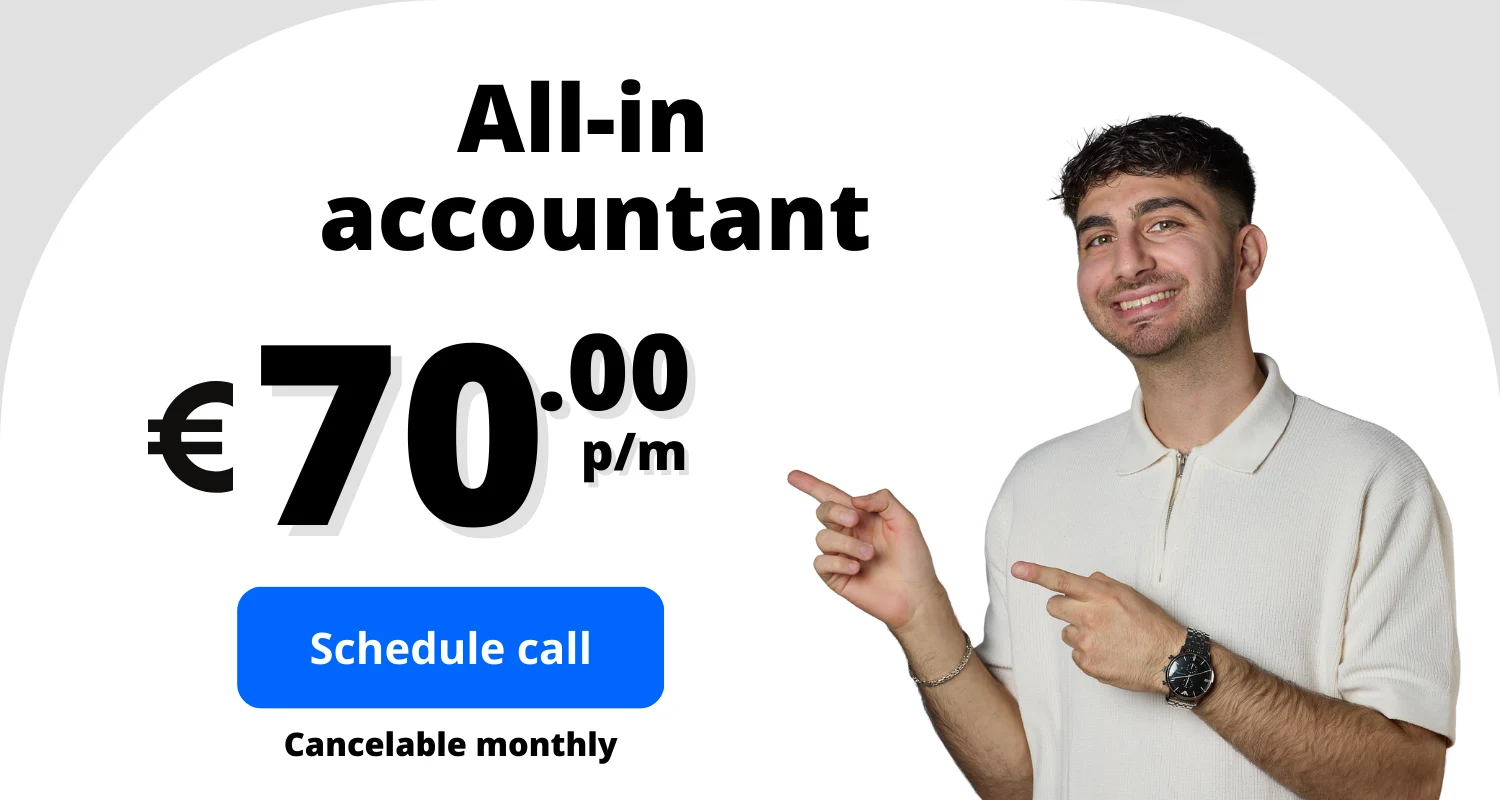What is income tax?
Income tax is the tax you pay on your income. This applies to people in employment and to self-employed entrepreneurs. As a self-employed person, you pay income tax on your profit, i.e. your turnover minus your expenses. This profit falls under profit from enterprise and is taxed in box 1. Every year you file a tax return and the amount of tax you have to pay is calculated. Income tax is used for collective facilities such as healthcare, education and infrastructure.
Income tax rates 2026
How much income tax you pay depends on the amount of your income and the box it falls into. For entrepreneurs, box 1 is the most important. The rates and brackets are adjusted annually. Below are the rates that apply in 2026. For people who will reach or have already reached the state pension age in 2026, lower rates in the first tranche.
Box 1: Work and home
Box 1 includes income from work, such as wages and profits from business. As a self-employed person, your profits are taxed here by default. The tax works with increasing brackets. So you do not pay one rate on your entire income, but per section.
Table box 1 rates 2026
| Disc | Taxable income | Rate |
|---|---|---|
| Disc 1 | Up to €38,883 | 35,75% |
| Disc 2 | €38,883 to €78,426 | 37,56% |
| Disc 3 | From €78,426 | 49,50% |
Your profit from business is added to any other Box 1 income. Only the part that falls in a higher bracket is taxed at that higher rate.
Example:
You are self-employed and make €50,000 profit in 2026.
- €38,883 falls in bracket 1 at 35.75%
- €11,117 falls in bracket 2 at 37.56%
So you pay tax per bracket. This does not yet include tax credits and deductions.
Box 2: Significant interest
Box 2 applies if you own at least 5% of the shares in a PLC. You pay tax on dividends and gains on sale of shares. A two-disc rate applies in 2026.
Table box 2 rates 2026
| Disc | Dividend income | Rate |
|---|---|---|
| Disc 1 | Up to €68,843 | 24,5% |
| Disc 2 | Above €68,843 | 31% |
The bv deducts 15% dividend tax. You set this off later on your income tax return.
Box 3: Wealth
Box 3 is about savings and investments. In 2026, the tax-free capital is €57,684 per person. Only the assets above that will be taxed. The tax is calculated on a notional return.
Table box 3 key points 2026
| Section | Value |
|---|---|
| Tax-free assets | €59.357 |
| Tax rate | 36% |
| Fictitious return on savings | approximately 1.28% |
| Fictitious return on investments | circa 6% |
Deductions and schemes for self-employed in 2026
As a self-employed person, you are allowed to reduce your profits with entrepreneurial deductions. As a result, you pay less income tax. These schemes are especially important if you are starting or investing in your business.
Self-employment deduction and start-up deduction
If you meet the hour criterion of 1,225 hours per year, you are entitled to a self-employed deduction of €1,200 in 2026. If you are a starter, you may add €2,123 starter's deduction on top of that up to three times in five years. These deductions immediately reduce your taxable profit.
SME profit exemption
After deducting entrepreneurial deductions, you may exempt 12.7% of the remaining profit. This exemption applies even if you do not meet the hour criterion. At higher incomes, the effect of entrepreneurial deductions does decrease.
Small-scale investment deduction
If you invest more than €2,900 in business assets in 2026, you can make use of the small-scale investment deduction. Per investment, the amount must be at least €450. The maximum deduction percentage is 28%. If you sell the asset within five years, a disinvestment addition may follow.
Am I an entrepreneur for income tax purposes?
Only if the tax authorities consider you an entrepreneur are you allowed deductions. Important criteria: hour criterion, expected profit, independence, risk, multiple clients and investments. If you do not meet these criteria, your income will fall under “other activities” without entrepreneurial benefits. You can easily check whether you count as an entrepreneur via the Entrepreneur check from the Inland Revenue.
Income tax calculation
The calculation proceeds in steps:
- Determine your profit from business (turnover minus expenses).
- Deduct entrepreneurial deductions such as self-employment deduction, start-up deduction and KIA.
- Apply the SME profit exemption (12.7% of profit after deductions).
- Calculate tax according to the box 1 brackets.
- Deduct tax credits, such as the general tax credit and employment tax credit.
Use our calculation tool which makes it easy.
Do income tax yourself or outsource?
With simple records, you can do the return yourself just fine. This provides insight and saves costs. With multiple sources of income, investments or tax schemes, outsourcing may be wise. An accountant can prevent mistakes and make optimal use of deductions. The costs often pay for themselves.
Requesting an extension for your tax return
The default deadline is 1 May 2027 for tax year 2026. You can apply for digital deferral until 30 April and then get a deferral until 1 September. If you do not apply for a deferral and are late, a fine may follow. Through an accountant, longer deferral is sometimes possible, if requested in time.
Avoid tax interest
From 1 July 2027, tax interest can be charged. The interest rate is around 6.5%. By filing a tax return or requesting a provisional assessment on time, you will avoid extra costs. Waiting costs money.
Frequently Asked Questions
When do I pay my income tax?
After your tax return, you will receive an assessment. Pay within the prescribed period to avoid penalties and interest. In case of postponement, the assessment will follow later.
How much tax do I pay as a self-employed person?
It depends on your profits and deductions. Up to around €31,000, you effectively pay no tax. Reserve about 30% of your profit, more at high profits.
What are the rates in box 1 in 2026?
35.75% up to €38,883, 37.56% up to €78,426 and 49.50% above that. Thanks to deductions and tax credits, your effective rate is usually lower.
What if I turn a loss?
You can offset losses against other income or other years. The tax authorities determine whether you are really an entrepreneur; structural losses may mean you do not have a business.
When am I an entrepreneur for tax purposes?
At 1,225 hours per year, profit expectation, self-employment, multiple clients, risk and Chamber of Commerce registration. In doubt? Do the entrepreneur check or ask for advice.






